Leadership and Management for Service Industries
VerifiedAdded on 2023/01/19
|9
|2639
|35
AI Summary
This document discusses various topics related to leadership and management in service industries. It covers classical management theories, leadership styles in the hospitality industry, internal and external factors influencing management styles and structures in the Wa-Pila Hotel, current soft and hard skills required for management and leadership styles, future skills needed, and a comparison between Holiday Inn and Hilton Hotels Group in implementing change. The document provides valuable insights and examples to understand the concepts better.
Contribute Materials
Your contribution can guide someone’s learning journey. Share your
documents today.
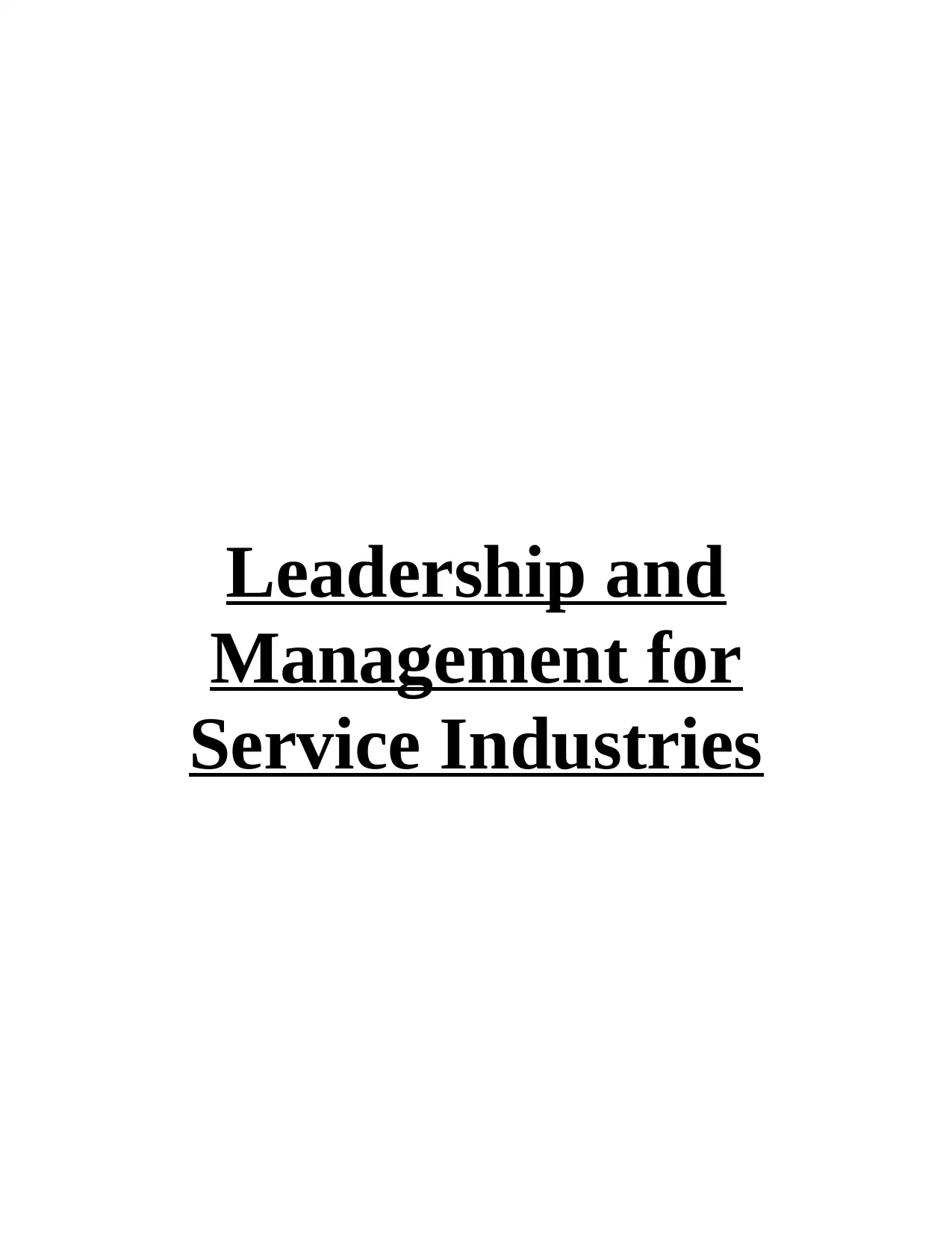
Leadership and
Management for
Service Industries
Management for
Service Industries
Secure Best Marks with AI Grader
Need help grading? Try our AI Grader for instant feedback on your assignments.
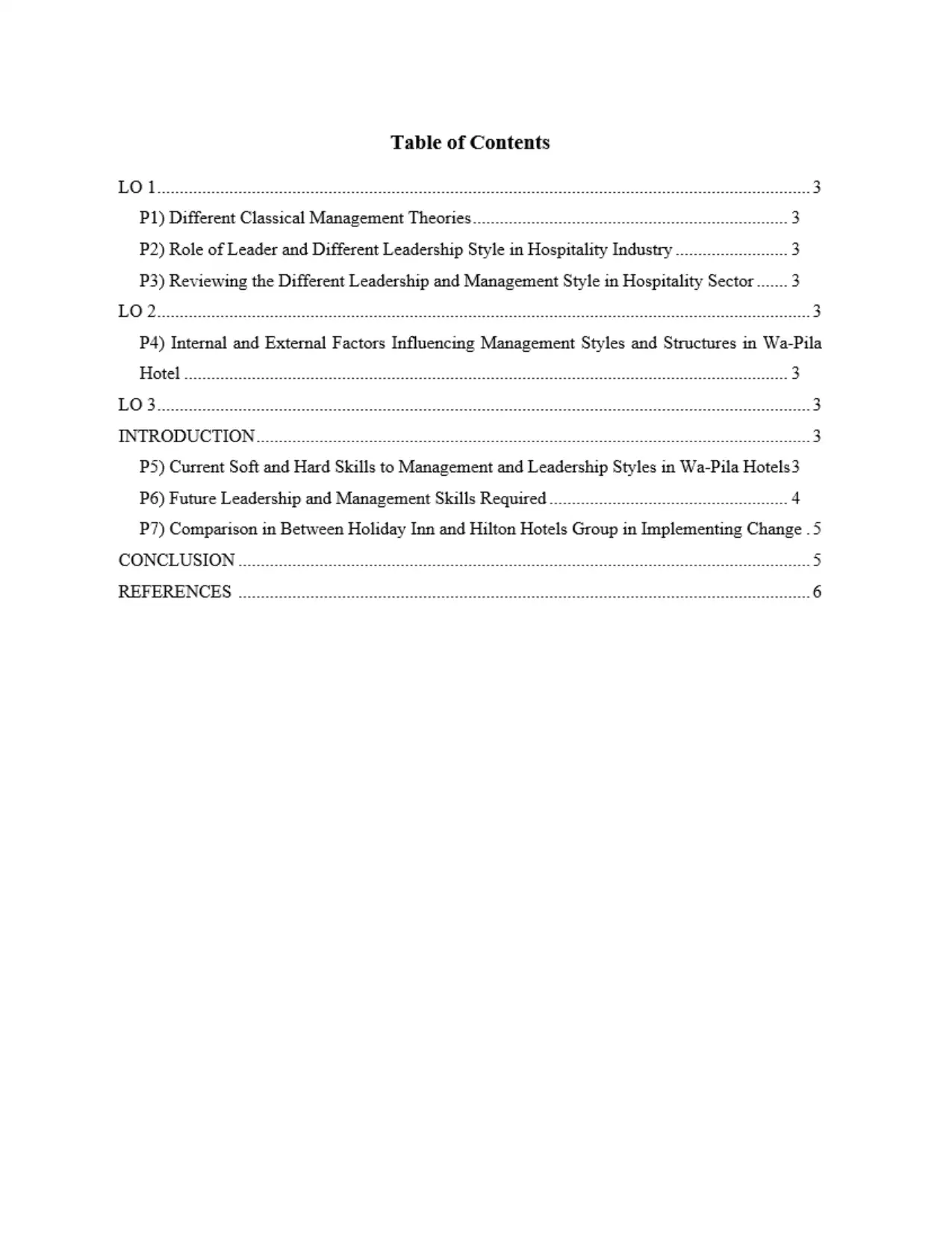
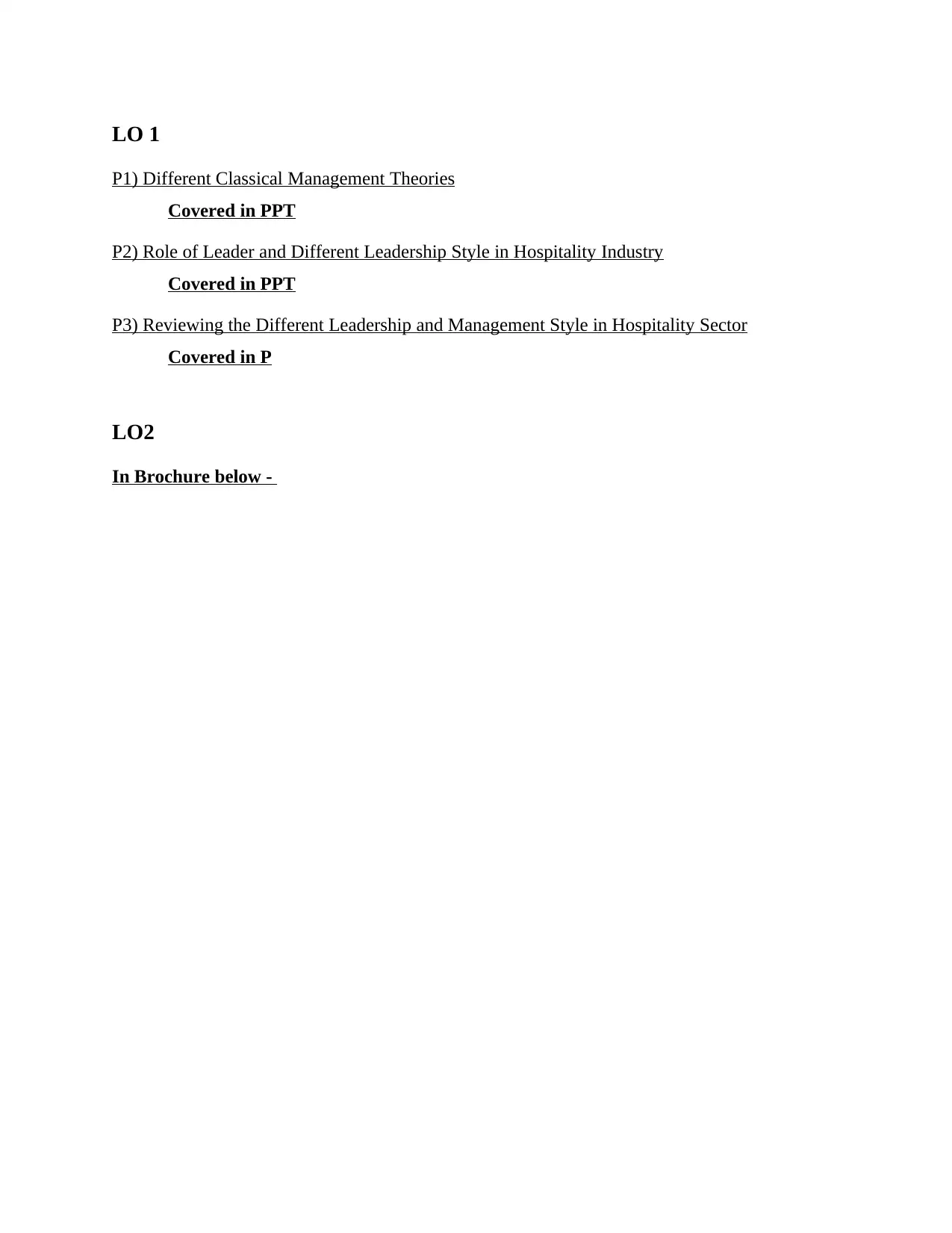
LO 1
P1) Different Classical Management Theories
Covered in PPT
P2) Role of Leader and Different Leadership Style in Hospitality Industry
Covered in PPT
P3) Reviewing the Different Leadership and Management Style in Hospitality Sector
Covered in P
LO2
In Brochure below -
P1) Different Classical Management Theories
Covered in PPT
P2) Role of Leader and Different Leadership Style in Hospitality Industry
Covered in PPT
P3) Reviewing the Different Leadership and Management Style in Hospitality Sector
Covered in P
LO2
In Brochure below -
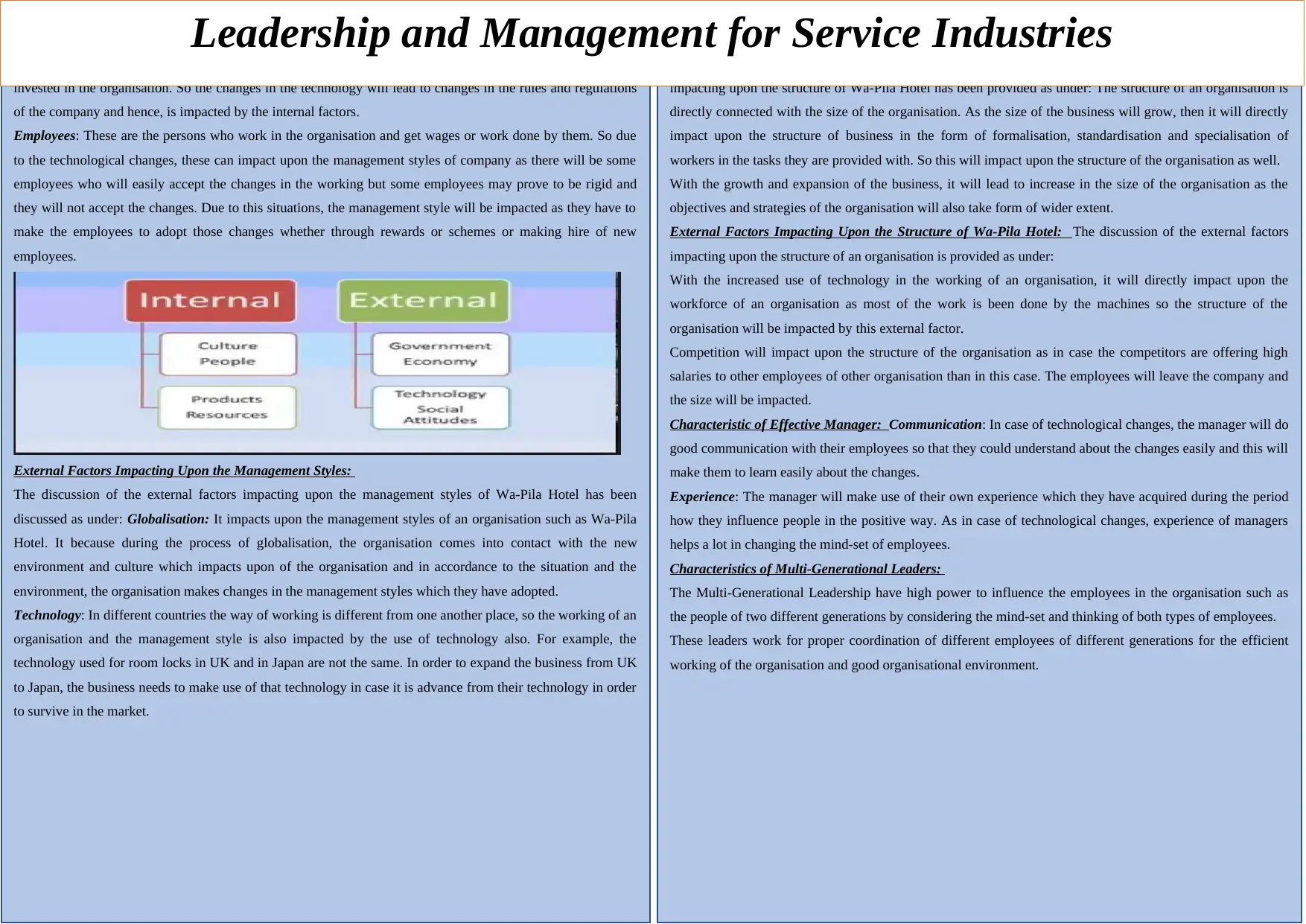
So for motivating employees to learn about the new technology, it is important to implement changes in the
management styles of the organisation.
Internal Factors Impacting Upon Structure of Wa-Pila Hotel: The discussion of the internal factors
impacting upon the structure of Wa-Pila Hotel has been provided as under: The structure of an organisation is
directly connected with the size of the organisation. As the size of the business will grow, then it will directly
impact upon the structure of business in the form of formalisation, standardisation and specialisation of
workers in the tasks they are provided with. So this will impact upon the structure of the organisation as well.
With the growth and expansion of the business, it will lead to increase in the size of the organisation as the
objectives and strategies of the organisation will also take form of wider extent.
External Factors Impacting Upon the Structure of Wa-Pila Hotel: The discussion of the external factors
impacting upon the structure of an organisation is provided as under:
With the increased use of technology in the working of an organisation, it will directly impact upon the
workforce of an organisation as most of the work is been done by the machines so the structure of the
organisation will be impacted by this external factor.
Competition will impact upon the structure of the organisation as in case the competitors are offering high
salaries to other employees of other organisation than in this case. The employees will leave the company and
the size will be impacted.
Characteristic of Effective Manager: Communication: In case of technological changes, the manager will do
good communication with their employees so that they could understand about the changes easily and this will
make them to learn easily about the changes.
Experience: The manager will make use of their own experience which they have acquired during the period
how they influence people in the positive way. As in case of technological changes, experience of managers
helps a lot in changing the mind-set of employees.
Characteristics of Multi-Generational Leaders:
The Multi-Generational Leadership have high power to influence the employees in the organisation such as
the people of two different generations by considering the mind-set and thinking of both types of employees.
These leaders work for proper coordination of different employees of different generations for the efficient
working of the organisation and good organisational environment.
P4) Internal and External Factors Influencing Management Styles and Structures in Wa-Pila Hotel
The discussion of the internal factors impacting upon the management styles have provided as under:
Owners: These can be defined as the people who have their direct interest in the organisation as their money is
invested in the organisation. So the changes in the technology will lead to changes in the rules and regulations
of the company and hence, is impacted by the internal factors.
Employees: These are the persons who work in the organisation and get wages or work done by them. So due
to the technological changes, these can impact upon the management styles of company as there will be some
employees who will easily accept the changes in the working but some employees may prove to be rigid and
they will not accept the changes. Due to this situations, the management style will be impacted as they have to
make the employees to adopt those changes whether through rewards or schemes or making hire of new
employees.
External Factors Impacting Upon the Management Styles:
The discussion of the external factors impacting upon the management styles of Wa-Pila Hotel has been
discussed as under: Globalisation: It impacts upon the management styles of an organisation such as Wa-Pila
Hotel. It because during the process of globalisation, the organisation comes into contact with the new
environment and culture which impacts upon of the organisation and in accordance to the situation and the
environment, the organisation makes changes in the management styles which they have adopted.
Technology: In different countries the way of working is different from one another place, so the working of an
organisation and the management style is also impacted by the use of technology also. For example, the
technology used for room locks in UK and in Japan are not the same. In order to expand the business from UK
to Japan, the business needs to make use of that technology in case it is advance from their technology in order
to survive in the market.
Leadership and Management for Service Industries
management styles of the organisation.
Internal Factors Impacting Upon Structure of Wa-Pila Hotel: The discussion of the internal factors
impacting upon the structure of Wa-Pila Hotel has been provided as under: The structure of an organisation is
directly connected with the size of the organisation. As the size of the business will grow, then it will directly
impact upon the structure of business in the form of formalisation, standardisation and specialisation of
workers in the tasks they are provided with. So this will impact upon the structure of the organisation as well.
With the growth and expansion of the business, it will lead to increase in the size of the organisation as the
objectives and strategies of the organisation will also take form of wider extent.
External Factors Impacting Upon the Structure of Wa-Pila Hotel: The discussion of the external factors
impacting upon the structure of an organisation is provided as under:
With the increased use of technology in the working of an organisation, it will directly impact upon the
workforce of an organisation as most of the work is been done by the machines so the structure of the
organisation will be impacted by this external factor.
Competition will impact upon the structure of the organisation as in case the competitors are offering high
salaries to other employees of other organisation than in this case. The employees will leave the company and
the size will be impacted.
Characteristic of Effective Manager: Communication: In case of technological changes, the manager will do
good communication with their employees so that they could understand about the changes easily and this will
make them to learn easily about the changes.
Experience: The manager will make use of their own experience which they have acquired during the period
how they influence people in the positive way. As in case of technological changes, experience of managers
helps a lot in changing the mind-set of employees.
Characteristics of Multi-Generational Leaders:
The Multi-Generational Leadership have high power to influence the employees in the organisation such as
the people of two different generations by considering the mind-set and thinking of both types of employees.
These leaders work for proper coordination of different employees of different generations for the efficient
working of the organisation and good organisational environment.
P4) Internal and External Factors Influencing Management Styles and Structures in Wa-Pila Hotel
The discussion of the internal factors impacting upon the management styles have provided as under:
Owners: These can be defined as the people who have their direct interest in the organisation as their money is
invested in the organisation. So the changes in the technology will lead to changes in the rules and regulations
of the company and hence, is impacted by the internal factors.
Employees: These are the persons who work in the organisation and get wages or work done by them. So due
to the technological changes, these can impact upon the management styles of company as there will be some
employees who will easily accept the changes in the working but some employees may prove to be rigid and
they will not accept the changes. Due to this situations, the management style will be impacted as they have to
make the employees to adopt those changes whether through rewards or schemes or making hire of new
employees.
External Factors Impacting Upon the Management Styles:
The discussion of the external factors impacting upon the management styles of Wa-Pila Hotel has been
discussed as under: Globalisation: It impacts upon the management styles of an organisation such as Wa-Pila
Hotel. It because during the process of globalisation, the organisation comes into contact with the new
environment and culture which impacts upon of the organisation and in accordance to the situation and the
environment, the organisation makes changes in the management styles which they have adopted.
Technology: In different countries the way of working is different from one another place, so the working of an
organisation and the management style is also impacted by the use of technology also. For example, the
technology used for room locks in UK and in Japan are not the same. In order to expand the business from UK
to Japan, the business needs to make use of that technology in case it is advance from their technology in order
to survive in the market.
Leadership and Management for Service Industries
Secure Best Marks with AI Grader
Need help grading? Try our AI Grader for instant feedback on your assignments.
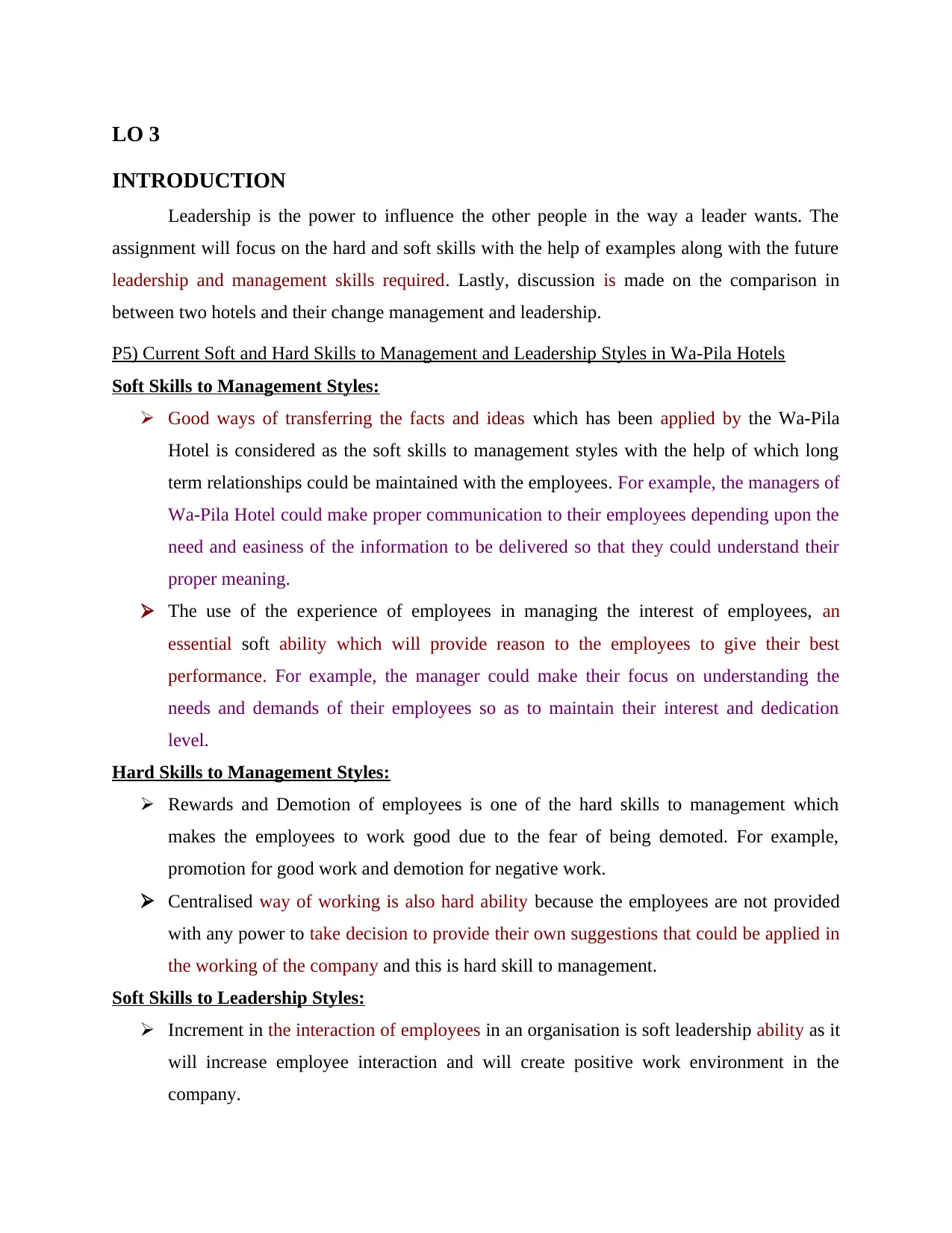
LO 3
INTRODUCTION
Leadership is the power to influence the other people in the way a leader wants. The
assignment will focus on the hard and soft skills with the help of examples along with the future
leadership and management skills required. Lastly, discussion is made on the comparison in
between two hotels and their change management and leadership.
P5) Current Soft and Hard Skills to Management and Leadership Styles in Wa-Pila Hotels
Soft Skills to Management Styles:
Good ways of transferring the facts and ideas which has been applied by the Wa-Pila
Hotel is considered as the soft skills to management styles with the help of which long
term relationships could be maintained with the employees. For example, the managers of
Wa-Pila Hotel could make proper communication to their employees depending upon the
need and easiness of the information to be delivered so that they could understand their
proper meaning.
The use of the experience of employees in managing the interest of employees, an
essential soft ability which will provide reason to the employees to give their best
performance. For example, the manager could make their focus on understanding the
needs and demands of their employees so as to maintain their interest and dedication
level.
Hard Skills to Management Styles:
Rewards and Demotion of employees is one of the hard skills to management which
makes the employees to work good due to the fear of being demoted. For example,
promotion for good work and demotion for negative work.
Centralised way of working is also hard ability because the employees are not provided
with any power to take decision to provide their own suggestions that could be applied in
the working of the company and this is hard skill to management.
Soft Skills to Leadership Styles:
Increment in the interaction of employees in an organisation is soft leadership ability as it
will increase employee interaction and will create positive work environment in the
company.
INTRODUCTION
Leadership is the power to influence the other people in the way a leader wants. The
assignment will focus on the hard and soft skills with the help of examples along with the future
leadership and management skills required. Lastly, discussion is made on the comparison in
between two hotels and their change management and leadership.
P5) Current Soft and Hard Skills to Management and Leadership Styles in Wa-Pila Hotels
Soft Skills to Management Styles:
Good ways of transferring the facts and ideas which has been applied by the Wa-Pila
Hotel is considered as the soft skills to management styles with the help of which long
term relationships could be maintained with the employees. For example, the managers of
Wa-Pila Hotel could make proper communication to their employees depending upon the
need and easiness of the information to be delivered so that they could understand their
proper meaning.
The use of the experience of employees in managing the interest of employees, an
essential soft ability which will provide reason to the employees to give their best
performance. For example, the manager could make their focus on understanding the
needs and demands of their employees so as to maintain their interest and dedication
level.
Hard Skills to Management Styles:
Rewards and Demotion of employees is one of the hard skills to management which
makes the employees to work good due to the fear of being demoted. For example,
promotion for good work and demotion for negative work.
Centralised way of working is also hard ability because the employees are not provided
with any power to take decision to provide their own suggestions that could be applied in
the working of the company and this is hard skill to management.
Soft Skills to Leadership Styles:
Increment in the interaction of employees in an organisation is soft leadership ability as it
will increase employee interaction and will create positive work environment in the
company.
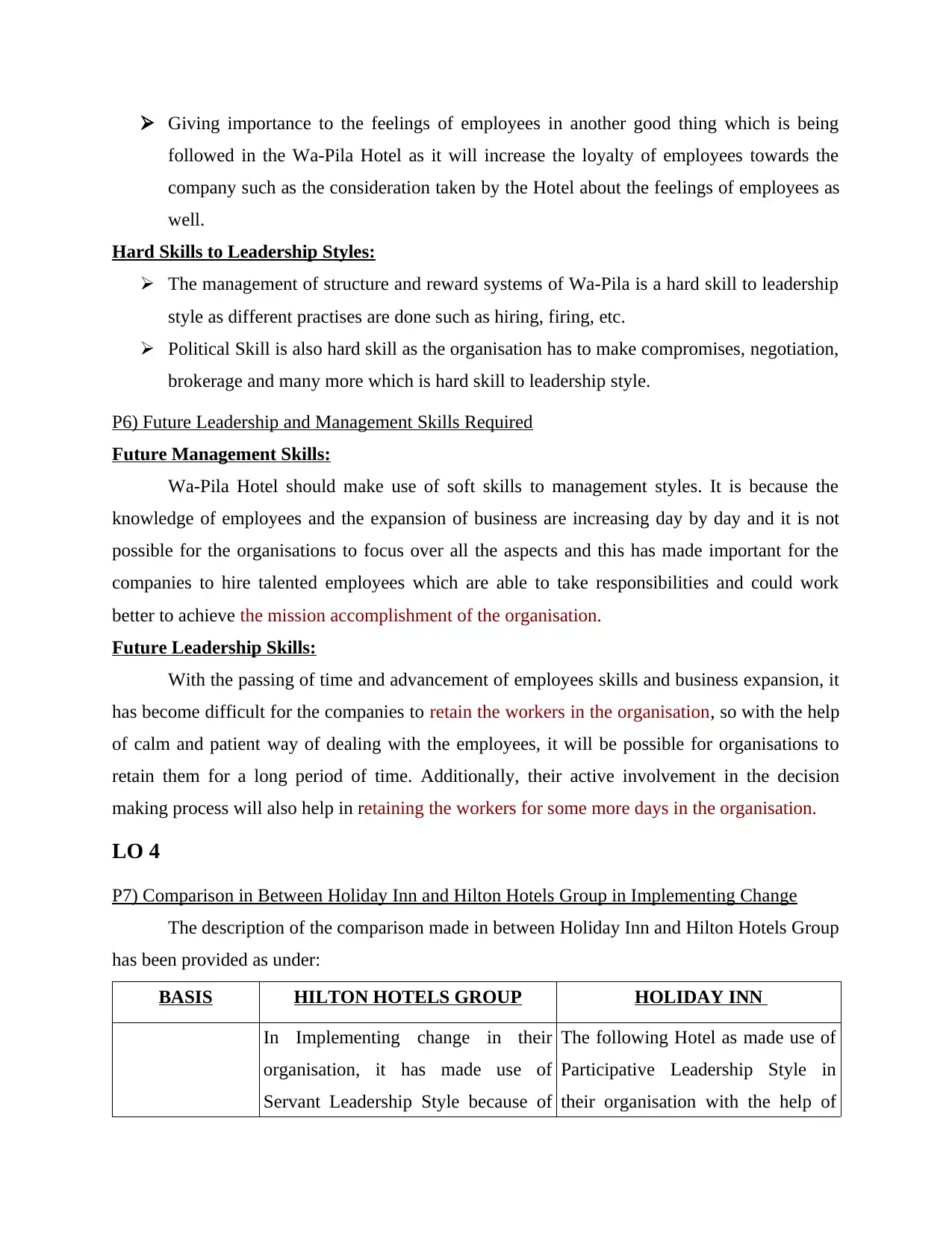
Giving importance to the feelings of employees in another good thing which is being
followed in the Wa-Pila Hotel as it will increase the loyalty of employees towards the
company such as the consideration taken by the Hotel about the feelings of employees as
well.
Hard Skills to Leadership Styles:
The management of structure and reward systems of Wa-Pila is a hard skill to leadership
style as different practises are done such as hiring, firing, etc.
Political Skill is also hard skill as the organisation has to make compromises, negotiation,
brokerage and many more which is hard skill to leadership style.
P6) Future Leadership and Management Skills Required
Future Management Skills:
Wa-Pila Hotel should make use of soft skills to management styles. It is because the
knowledge of employees and the expansion of business are increasing day by day and it is not
possible for the organisations to focus over all the aspects and this has made important for the
companies to hire talented employees which are able to take responsibilities and could work
better to achieve the mission accomplishment of the organisation.
Future Leadership Skills:
With the passing of time and advancement of employees skills and business expansion, it
has become difficult for the companies to retain the workers in the organisation, so with the help
of calm and patient way of dealing with the employees, it will be possible for organisations to
retain them for a long period of time. Additionally, their active involvement in the decision
making process will also help in retaining the workers for some more days in the organisation.
LO 4
P7) Comparison in Between Holiday Inn and Hilton Hotels Group in Implementing Change
The description of the comparison made in between Holiday Inn and Hilton Hotels Group
has been provided as under:
BASIS HILTON HOTELS GROUP HOLIDAY INN
In Implementing change in their
organisation, it has made use of
Servant Leadership Style because of
The following Hotel as made use of
Participative Leadership Style in
their organisation with the help of
followed in the Wa-Pila Hotel as it will increase the loyalty of employees towards the
company such as the consideration taken by the Hotel about the feelings of employees as
well.
Hard Skills to Leadership Styles:
The management of structure and reward systems of Wa-Pila is a hard skill to leadership
style as different practises are done such as hiring, firing, etc.
Political Skill is also hard skill as the organisation has to make compromises, negotiation,
brokerage and many more which is hard skill to leadership style.
P6) Future Leadership and Management Skills Required
Future Management Skills:
Wa-Pila Hotel should make use of soft skills to management styles. It is because the
knowledge of employees and the expansion of business are increasing day by day and it is not
possible for the organisations to focus over all the aspects and this has made important for the
companies to hire talented employees which are able to take responsibilities and could work
better to achieve the mission accomplishment of the organisation.
Future Leadership Skills:
With the passing of time and advancement of employees skills and business expansion, it
has become difficult for the companies to retain the workers in the organisation, so with the help
of calm and patient way of dealing with the employees, it will be possible for organisations to
retain them for a long period of time. Additionally, their active involvement in the decision
making process will also help in retaining the workers for some more days in the organisation.
LO 4
P7) Comparison in Between Holiday Inn and Hilton Hotels Group in Implementing Change
The description of the comparison made in between Holiday Inn and Hilton Hotels Group
has been provided as under:
BASIS HILTON HOTELS GROUP HOLIDAY INN
In Implementing change in their
organisation, it has made use of
Servant Leadership Style because of
The following Hotel as made use of
Participative Leadership Style in
their organisation with the help of
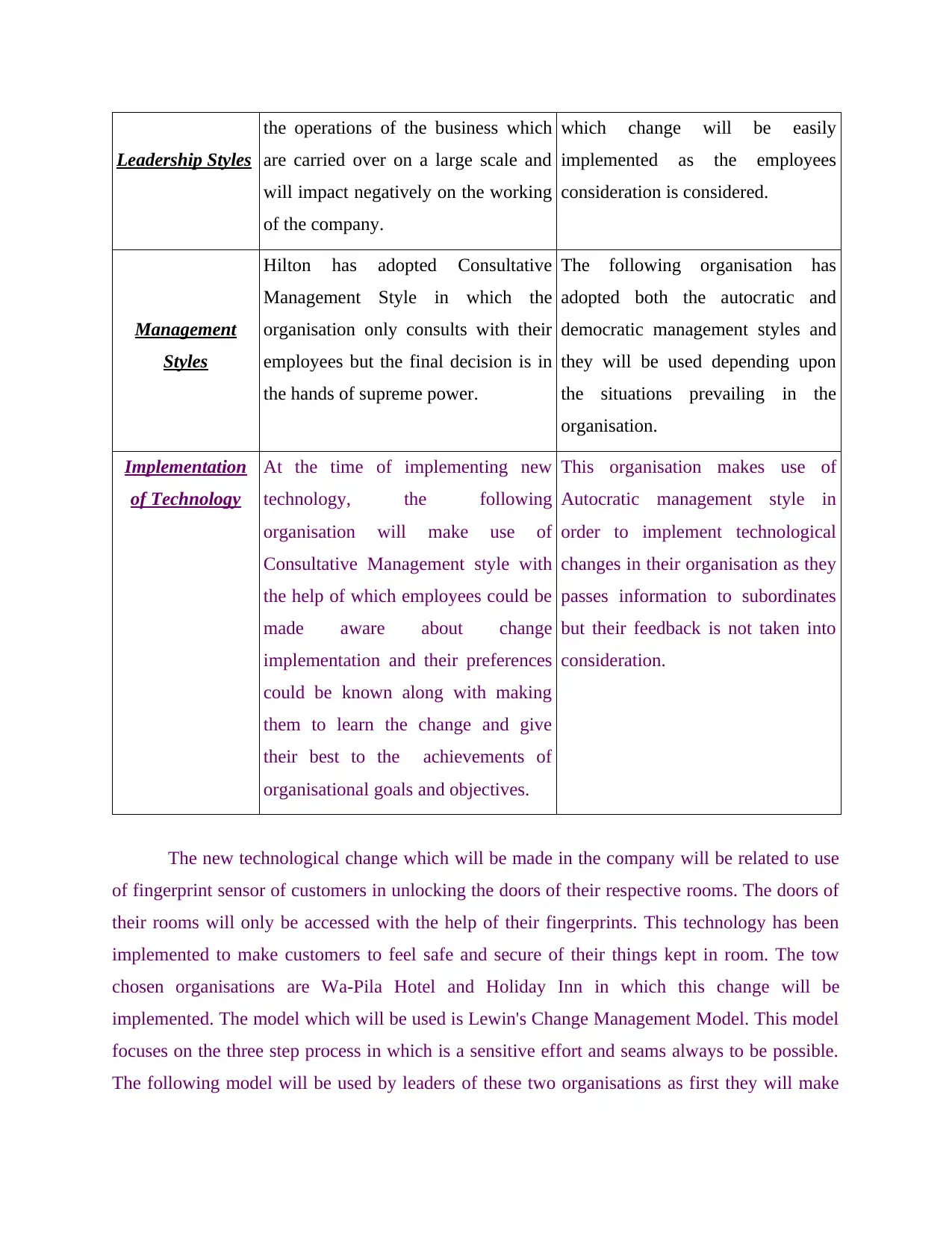
Leadership Styles
the operations of the business which
are carried over on a large scale and
will impact negatively on the working
of the company.
which change will be easily
implemented as the employees
consideration is considered.
Management
Styles
Hilton has adopted Consultative
Management Style in which the
organisation only consults with their
employees but the final decision is in
the hands of supreme power.
The following organisation has
adopted both the autocratic and
democratic management styles and
they will be used depending upon
the situations prevailing in the
organisation.
Implementation
of Technology
At the time of implementing new
technology, the following
organisation will make use of
Consultative Management style with
the help of which employees could be
made aware about change
implementation and their preferences
could be known along with making
them to learn the change and give
their best to the achievements of
organisational goals and objectives.
This organisation makes use of
Autocratic management style in
order to implement technological
changes in their organisation as they
passes information to subordinates
but their feedback is not taken into
consideration.
The new technological change which will be made in the company will be related to use
of fingerprint sensor of customers in unlocking the doors of their respective rooms. The doors of
their rooms will only be accessed with the help of their fingerprints. This technology has been
implemented to make customers to feel safe and secure of their things kept in room. The tow
chosen organisations are Wa-Pila Hotel and Holiday Inn in which this change will be
implemented. The model which will be used is Lewin's Change Management Model. This model
focuses on the three step process in which is a sensitive effort and seams always to be possible.
The following model will be used by leaders of these two organisations as first they will make
the operations of the business which
are carried over on a large scale and
will impact negatively on the working
of the company.
which change will be easily
implemented as the employees
consideration is considered.
Management
Styles
Hilton has adopted Consultative
Management Style in which the
organisation only consults with their
employees but the final decision is in
the hands of supreme power.
The following organisation has
adopted both the autocratic and
democratic management styles and
they will be used depending upon
the situations prevailing in the
organisation.
Implementation
of Technology
At the time of implementing new
technology, the following
organisation will make use of
Consultative Management style with
the help of which employees could be
made aware about change
implementation and their preferences
could be known along with making
them to learn the change and give
their best to the achievements of
organisational goals and objectives.
This organisation makes use of
Autocratic management style in
order to implement technological
changes in their organisation as they
passes information to subordinates
but their feedback is not taken into
consideration.
The new technological change which will be made in the company will be related to use
of fingerprint sensor of customers in unlocking the doors of their respective rooms. The doors of
their rooms will only be accessed with the help of their fingerprints. This technology has been
implemented to make customers to feel safe and secure of their things kept in room. The tow
chosen organisations are Wa-Pila Hotel and Holiday Inn in which this change will be
implemented. The model which will be used is Lewin's Change Management Model. This model
focuses on the three step process in which is a sensitive effort and seams always to be possible.
The following model will be used by leaders of these two organisations as first they will make
Paraphrase This Document
Need a fresh take? Get an instant paraphrase of this document with our AI Paraphraser
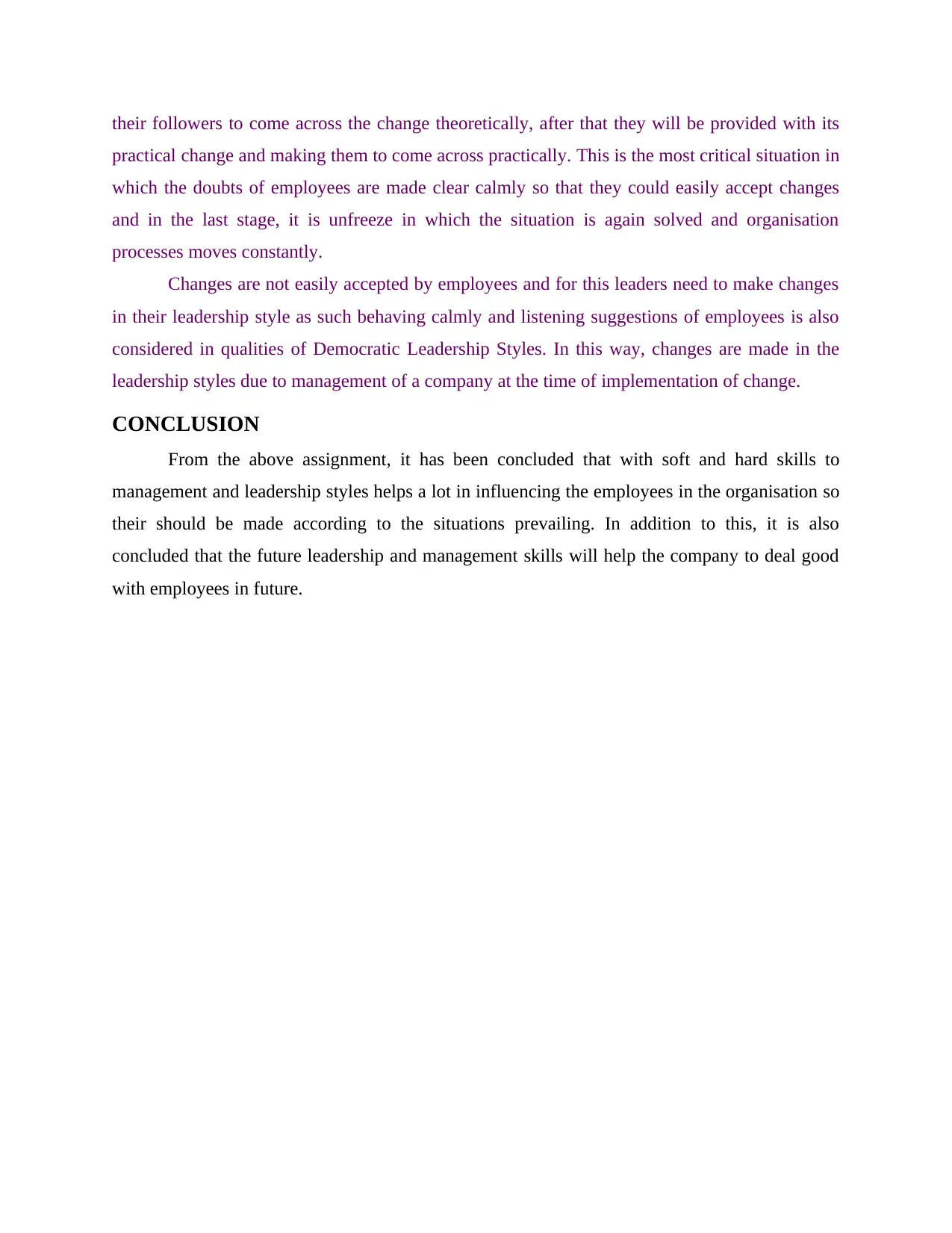
their followers to come across the change theoretically, after that they will be provided with its
practical change and making them to come across practically. This is the most critical situation in
which the doubts of employees are made clear calmly so that they could easily accept changes
and in the last stage, it is unfreeze in which the situation is again solved and organisation
processes moves constantly.
Changes are not easily accepted by employees and for this leaders need to make changes
in their leadership style as such behaving calmly and listening suggestions of employees is also
considered in qualities of Democratic Leadership Styles. In this way, changes are made in the
leadership styles due to management of a company at the time of implementation of change.
CONCLUSION
From the above assignment, it has been concluded that with soft and hard skills to
management and leadership styles helps a lot in influencing the employees in the organisation so
their should be made according to the situations prevailing. In addition to this, it is also
concluded that the future leadership and management skills will help the company to deal good
with employees in future.
practical change and making them to come across practically. This is the most critical situation in
which the doubts of employees are made clear calmly so that they could easily accept changes
and in the last stage, it is unfreeze in which the situation is again solved and organisation
processes moves constantly.
Changes are not easily accepted by employees and for this leaders need to make changes
in their leadership style as such behaving calmly and listening suggestions of employees is also
considered in qualities of Democratic Leadership Styles. In this way, changes are made in the
leadership styles due to management of a company at the time of implementation of change.
CONCLUSION
From the above assignment, it has been concluded that with soft and hard skills to
management and leadership styles helps a lot in influencing the employees in the organisation so
their should be made according to the situations prevailing. In addition to this, it is also
concluded that the future leadership and management skills will help the company to deal good
with employees in future.
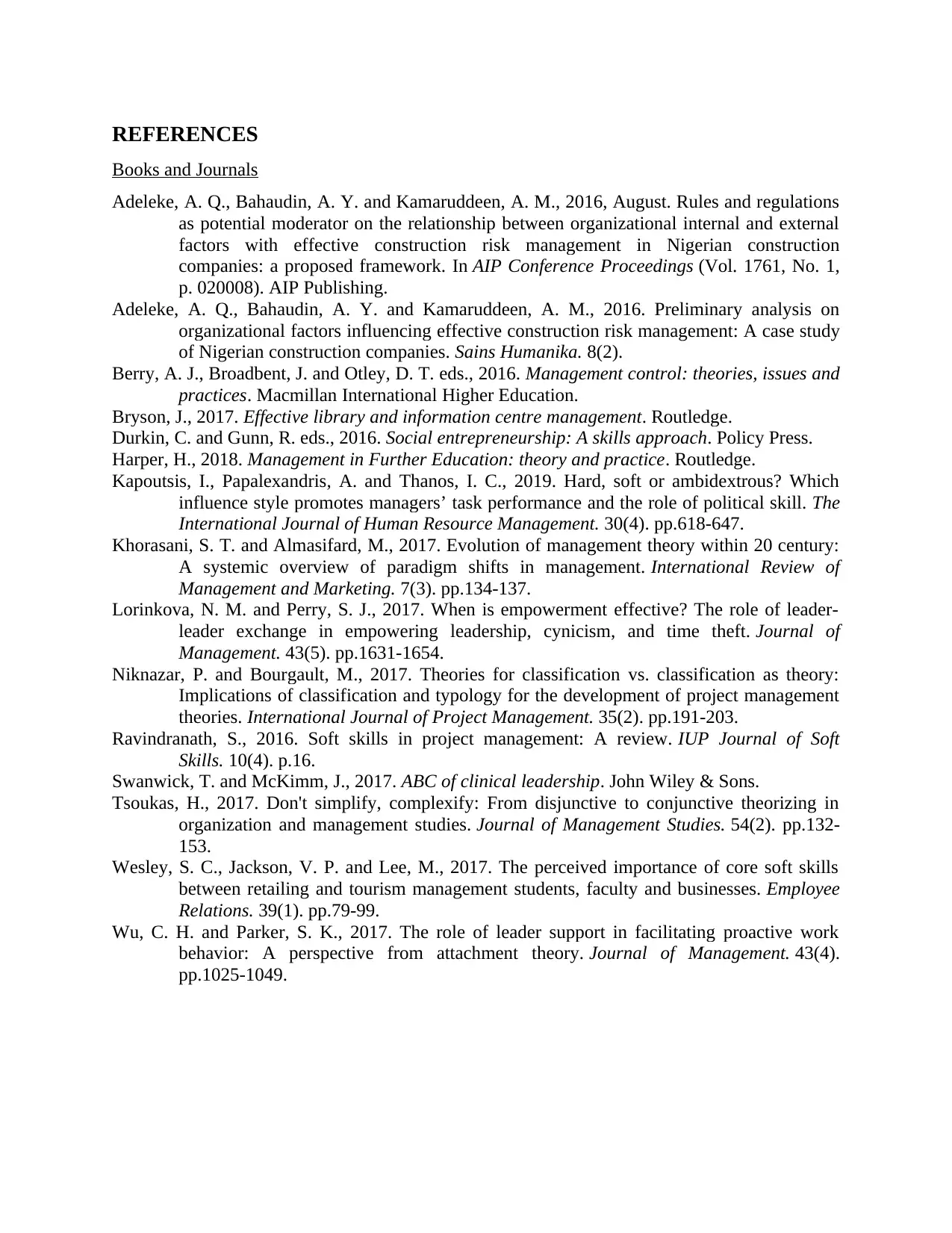
REFERENCES
Books and Journals
Adeleke, A. Q., Bahaudin, A. Y. and Kamaruddeen, A. M., 2016, August. Rules and regulations
as potential moderator on the relationship between organizational internal and external
factors with effective construction risk management in Nigerian construction
companies: a proposed framework. In AIP Conference Proceedings (Vol. 1761, No. 1,
p. 020008). AIP Publishing.
Adeleke, A. Q., Bahaudin, A. Y. and Kamaruddeen, A. M., 2016. Preliminary analysis on
organizational factors influencing effective construction risk management: A case study
of Nigerian construction companies. Sains Humanika. 8(2).
Berry, A. J., Broadbent, J. and Otley, D. T. eds., 2016. Management control: theories, issues and
practices. Macmillan International Higher Education.
Bryson, J., 2017. Effective library and information centre management. Routledge.
Durkin, C. and Gunn, R. eds., 2016. Social entrepreneurship: A skills approach. Policy Press.
Harper, H., 2018. Management in Further Education: theory and practice. Routledge.
Kapoutsis, I., Papalexandris, A. and Thanos, I. C., 2019. Hard, soft or ambidextrous? Which
influence style promotes managers’ task performance and the role of political skill. The
International Journal of Human Resource Management. 30(4). pp.618-647.
Khorasani, S. T. and Almasifard, M., 2017. Evolution of management theory within 20 century:
A systemic overview of paradigm shifts in management. International Review of
Management and Marketing. 7(3). pp.134-137.
Lorinkova, N. M. and Perry, S. J., 2017. When is empowerment effective? The role of leader-
leader exchange in empowering leadership, cynicism, and time theft. Journal of
Management. 43(5). pp.1631-1654.
Niknazar, P. and Bourgault, M., 2017. Theories for classification vs. classification as theory:
Implications of classification and typology for the development of project management
theories. International Journal of Project Management. 35(2). pp.191-203.
Ravindranath, S., 2016. Soft skills in project management: A review. IUP Journal of Soft
Skills. 10(4). p.16.
Swanwick, T. and McKimm, J., 2017. ABC of clinical leadership. John Wiley & Sons.
Tsoukas, H., 2017. Don't simplify, complexify: From disjunctive to conjunctive theorizing in
organization and management studies. Journal of Management Studies. 54(2). pp.132-
153.
Wesley, S. C., Jackson, V. P. and Lee, M., 2017. The perceived importance of core soft skills
between retailing and tourism management students, faculty and businesses. Employee
Relations. 39(1). pp.79-99.
Wu, C. H. and Parker, S. K., 2017. The role of leader support in facilitating proactive work
behavior: A perspective from attachment theory. Journal of Management. 43(4).
pp.1025-1049.
Books and Journals
Adeleke, A. Q., Bahaudin, A. Y. and Kamaruddeen, A. M., 2016, August. Rules and regulations
as potential moderator on the relationship between organizational internal and external
factors with effective construction risk management in Nigerian construction
companies: a proposed framework. In AIP Conference Proceedings (Vol. 1761, No. 1,
p. 020008). AIP Publishing.
Adeleke, A. Q., Bahaudin, A. Y. and Kamaruddeen, A. M., 2016. Preliminary analysis on
organizational factors influencing effective construction risk management: A case study
of Nigerian construction companies. Sains Humanika. 8(2).
Berry, A. J., Broadbent, J. and Otley, D. T. eds., 2016. Management control: theories, issues and
practices. Macmillan International Higher Education.
Bryson, J., 2017. Effective library and information centre management. Routledge.
Durkin, C. and Gunn, R. eds., 2016. Social entrepreneurship: A skills approach. Policy Press.
Harper, H., 2018. Management in Further Education: theory and practice. Routledge.
Kapoutsis, I., Papalexandris, A. and Thanos, I. C., 2019. Hard, soft or ambidextrous? Which
influence style promotes managers’ task performance and the role of political skill. The
International Journal of Human Resource Management. 30(4). pp.618-647.
Khorasani, S. T. and Almasifard, M., 2017. Evolution of management theory within 20 century:
A systemic overview of paradigm shifts in management. International Review of
Management and Marketing. 7(3). pp.134-137.
Lorinkova, N. M. and Perry, S. J., 2017. When is empowerment effective? The role of leader-
leader exchange in empowering leadership, cynicism, and time theft. Journal of
Management. 43(5). pp.1631-1654.
Niknazar, P. and Bourgault, M., 2017. Theories for classification vs. classification as theory:
Implications of classification and typology for the development of project management
theories. International Journal of Project Management. 35(2). pp.191-203.
Ravindranath, S., 2016. Soft skills in project management: A review. IUP Journal of Soft
Skills. 10(4). p.16.
Swanwick, T. and McKimm, J., 2017. ABC of clinical leadership. John Wiley & Sons.
Tsoukas, H., 2017. Don't simplify, complexify: From disjunctive to conjunctive theorizing in
organization and management studies. Journal of Management Studies. 54(2). pp.132-
153.
Wesley, S. C., Jackson, V. P. and Lee, M., 2017. The perceived importance of core soft skills
between retailing and tourism management students, faculty and businesses. Employee
Relations. 39(1). pp.79-99.
Wu, C. H. and Parker, S. K., 2017. The role of leader support in facilitating proactive work
behavior: A perspective from attachment theory. Journal of Management. 43(4).
pp.1025-1049.
1 out of 9
Related Documents
Your All-in-One AI-Powered Toolkit for Academic Success.
+13062052269
info@desklib.com
Available 24*7 on WhatsApp / Email
![[object Object]](/_next/static/media/star-bottom.7253800d.svg)
Unlock your academic potential
© 2024 | Zucol Services PVT LTD | All rights reserved.

![[PDF] Leadership Style and Culture for Innovations in Hotel Industry](/_next/image/?url=https%3A%2F%2Fdesklib.com%2Fmedia%2Fimages%2Fgj%2Fecf83eee24d5481fb4e971d63e4f2e3f.jpg&w=256&q=75)



